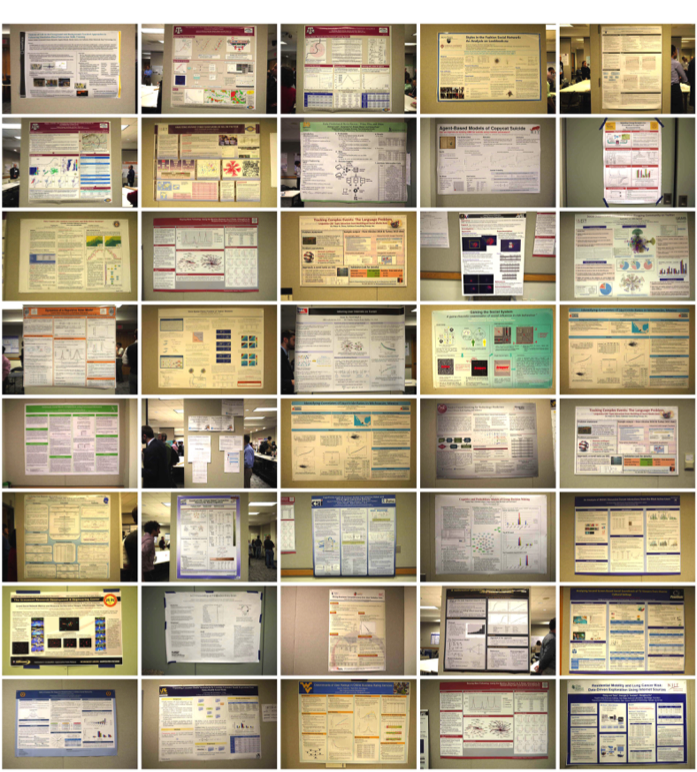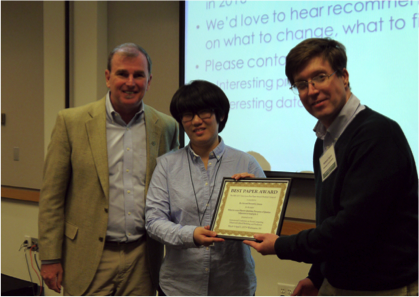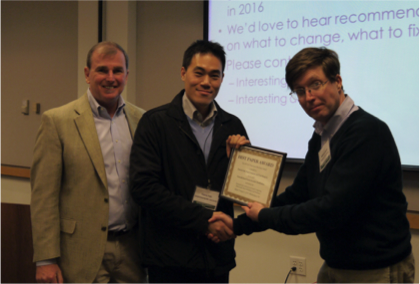2016 International Conference on Social Computing, Behavioral-Cultural Modeling & Prediction and Behavior Representation in Modeling and Simulation
June 28 - July 1, 2016, UCDC Center, Washington DC, USA
All papers are qualified for the Best Paper Award. Papers with student first authors will be considered for the Best Student Paper Award. Those receiving these awards will be invited to publish an extended version in a special issue of the journal Computational and Mathematical Organization Theory.
IMPORTANT DATES:
General Paper Registration Deadline: January 22, 2016 February 4, 2016
General Paper Due: January 28, 2016 February 4, 2016
General Paper Registration Closed; however you can still submit for Late Breaking Results and Posters!
Author Notification: March 1, 2016 March 17, 2016
Final Version: March 14, 2016 March 31, 2016
- Note, all general papers will be evaluated for: presentation in plenary, presentation as poster, or no presentation. All accepted papers will be
published in the physical proceedings.
Posters & Demos Short Papers Registration Deadline: May 1, 2016
Short Papers due: February 1 - May 1, 2016 (rolling)
Author Notification: 2 weeks after submission
- This submission is intended for late breaking results, technology demos, those papers from industry, government or the military where constraints prevent
the authors from writing a full paper. All short papers (including those describing demos) will be evaluated for: presentation as a poster, or no
presentation. All accepted papers will be published in the online proceedings only.
Tutorial proposals due: February 1, 2016 March 4, 2016
Pre-conference Tutorial Sessions: June 28, 2016
Poster Session: June 29 evening
Technology Demos: June 29 - July 1, 2016
Challenge Problem Evaluation: June 29 evening
Conference General Paper Presentations: June 29-July 1, 2016, in plenary
CALL FOR PAPERS:
Submissions are solicited on research issues, theories, and applications. Topics of interests include the following:
Modeling
* Intelligent agents and avatars/adversarial modeling* Cognitive robotics and human-robot interaction
* Models of reasoning and decision making
* Model validation & comparison
* Socio-cultural M&S: team/group/crowd/behavior
* Physical models of human movement
* Performance assessment & skill monitoring/tracking
* Performance predicition/enhancement/optimization
* Intelligent tutoring systems
* Knowledge acquisition/engineering
* Human behavior issues in model federations
Basic Research on Sociocultural & Behavioral Processes
* Group interaction and collaboration* Group formation and evolution
* Group representation and profiling
* Collective action and governance
* Cultural patterns & representation
* Social conventions and social contexts
* Influence process and recognition
* Public opinion representation
* Information diffusion
* Psycho-cultural situation awareness
Methodological Issues
* Mathematical foundations* Verification and validation
* Sensitivity analysis
* Matching technique or method to research questions
* Metrics and evaluation
* Methodological innovation
* Model federation and integration
* Evolutionary computing
* Optimization
Information, Systems, & Network Science
* Data mining on social media platforms* Diffusion and other dynamic processes over networks
* Inference of network topologies and changes over time
* Analysis of link formations and link types
* Detection of communities and other types of structures in networks
* Analysis of high-dimensional networks
Military & Intelligence Applications
* Evaluation, modeling and simulation* Group formation and evolution in the political context
* Technology and flash crowds
* Networks and political influence
* Group representation and profiling
* Reasoning about terrorist group behaviors and policies towards them
Health Applications
* Social network analysis to understand health behavior* Modeling of health policy and decision making
* Modeling of behavioral aspects of infectious disease spread
* Intervention design and modeling for behavioral health
Other Applications
* Economic applications of behavioral and social prediction* Viral marketing
* Reasoning about development aid through social modeling
* Reasoning about global educational efforts through cognitive simulation
FORMAT AND SUBMISSION:
The conference solicits three categories of papers:
Regular papers (max. 10 pages)
All topics and authors (academic, government, industry) welcomePublished in a Springer volume and online. Plenary or poster presentation.
Late-breaking results (max. 6 pages)
All topics and authors welcome.Published online. Typically a poster or plenary presentation.
Demos and Industry Track (2-page abstract, or max. 6 pages)
Published online. Typically a poster or demo presentation.The papers must be in English and MUST be formatted according to the Springer-Verlag LNCS/LNAI guidelines. Sample LaTeX2e and WORD files are available at http://www.springer.com/computer/lncs?SGWID=0-164-6-793341-0. It is not required to submit a cover page first, this is optional.
All submissions for posters, demo-presentations, challenge problem entries and late breaking results should be submitted as a paper with a maximum of 6 pages using the same format as the regular papers. All accepted entries will be posted on the SBP-BRiMS 2016 website.
A selection of authors will be invited to contribute journal versions of their papers to one of two planned special issues of the Springer journal “Computational and Mathematical Organization Theory” and another high-profile journal.
Authors of accepted submissions of any category have the choice to withhold their paper from publication online and in the Springer book. The submission, however, follows the regular format and undergoes the same review process.
The submission website will be available at: https://easychair.org/conferences/?conf=sbpbrims2016.
To register a paper, use the standard Easychair submission website and submit your title and abstract. Until the final paper deadline, you will be able to update your submission. Please note, registering a paper is optional, it just supports finding reviewers. Thus the registration process helps us categorize papers and assign them to reviewers. The final deadline is Feb 4, 2016.
PUBLICATION
For any questions and inquiries concerning submissions, please email the program chairs.
PRE-CONFERENCE TUTORIAL SESSIONS:
Several half-day sessions will be offered on the day before the full conference. Sessions will be designed to meet the needs of one of two distinct groups. One group will consist of attendees who have backgrounds in computational science; computer science, engineering, and other mathematically oriented disciplines. Other tutorial sessions will be designed for behavioral and social scientists and others (e.g. those with medical backgrounds or training in public health) who may have limited formal education in the computational sciences. Attendees will gain an understanding of terminology, theories, and general approaches employed by computationally based fields, especially with respect to modeling approaches.
Tutorial proposal submission:
Tutorial proposals should be submitted in plain text or PDF, by email to the tutorial chair, Yu-Ru Lin. The email should have "SBP-BRiMS 2016 tutorial submission" in the subject header. The proposal should include the following elements: * Title of the tutorial * Description of the tutorial topic and expected audience (including the expected backgrounds of the attendees) * Short bio and contact information of the organizersMore details regarding the preconference tutorial sessions, including instructors, course content, and registration information will be posted to the conference website (SBP-BRiMS.org) as soon as this information becomes available.
Note that the plans for the tutorial sessions are in progress and are subject to change.
POSTER & NETWORKING SESSION:
We expect to invite the majority of all authors of paper submissions to present a poster at a catered poster and network session.
DEMO SESSION:
We invite technical demonstrations from academia, industry and government. Please submit a 2-page abstract. We will provide a desk and power.
CHALLENGE:
The conference expects to announce a data modeling challenge as in previous years.
FUNDING PANEL & CROSS-FERTILIZATION ROUNDTABLES:
Previous SBP conferences have included a Cross-fertilization Roundtable session or a Funding Panel. The purpose of the cross-fertilization roundtables is to help participants become better acquainted with people outside of their discipline and with whom they might consider partnering on future SBP-related research collaborations. The Funding Panel provides an opportunity for conference participants to interact with program managers from various federal funding agencies. Participants for the previous funding panels have included representatives from federal agencies, such as the NSF, NIH, DoD, ONR, AFOSR, USDA, etc. The details for 2016 will be confirmed at a later date.
BEST PAPER AWARDS:
SBP-BRiMS16 will feature a Best Paper Award and a Best Student Paper Award. All papers are qualified for the Best Paper Award. Papers with student first authors will be considered for the Best Student Paper Award.
HOTEL AND LOGISTICS:
Information on hotel and logistics will be provided at the conference website as it becomes available.
TRAVEL SCHOLARSHIPS:
It is anticipated that a limited number travel scholarships will be available on a competitive basis. Additional information will be provided on the SBP-BRiMS Conference website as it becomes available.To register a paper, use the standard Easychair submission website and submit your title and abstract. Until the final paper deadline, you will be able to update your submission. Please note, registering a paper is optional, it just supports finding reviewers. Thus the registration process helps us categorize papers and assign them to reviewers. The final deadline for general papers was Feb 4, 2016; however, you can still submit for Late Breaking Results and Posters!


